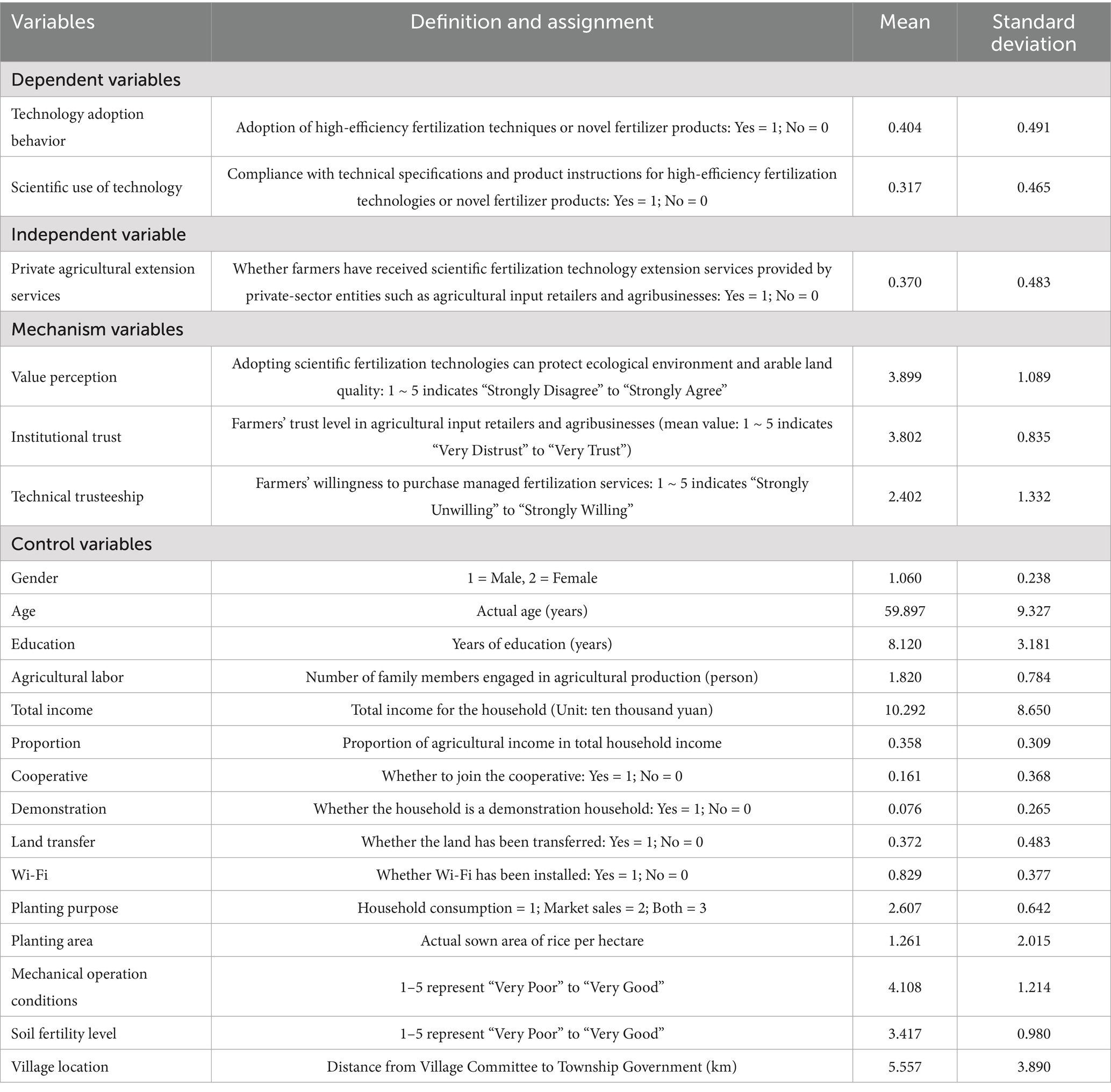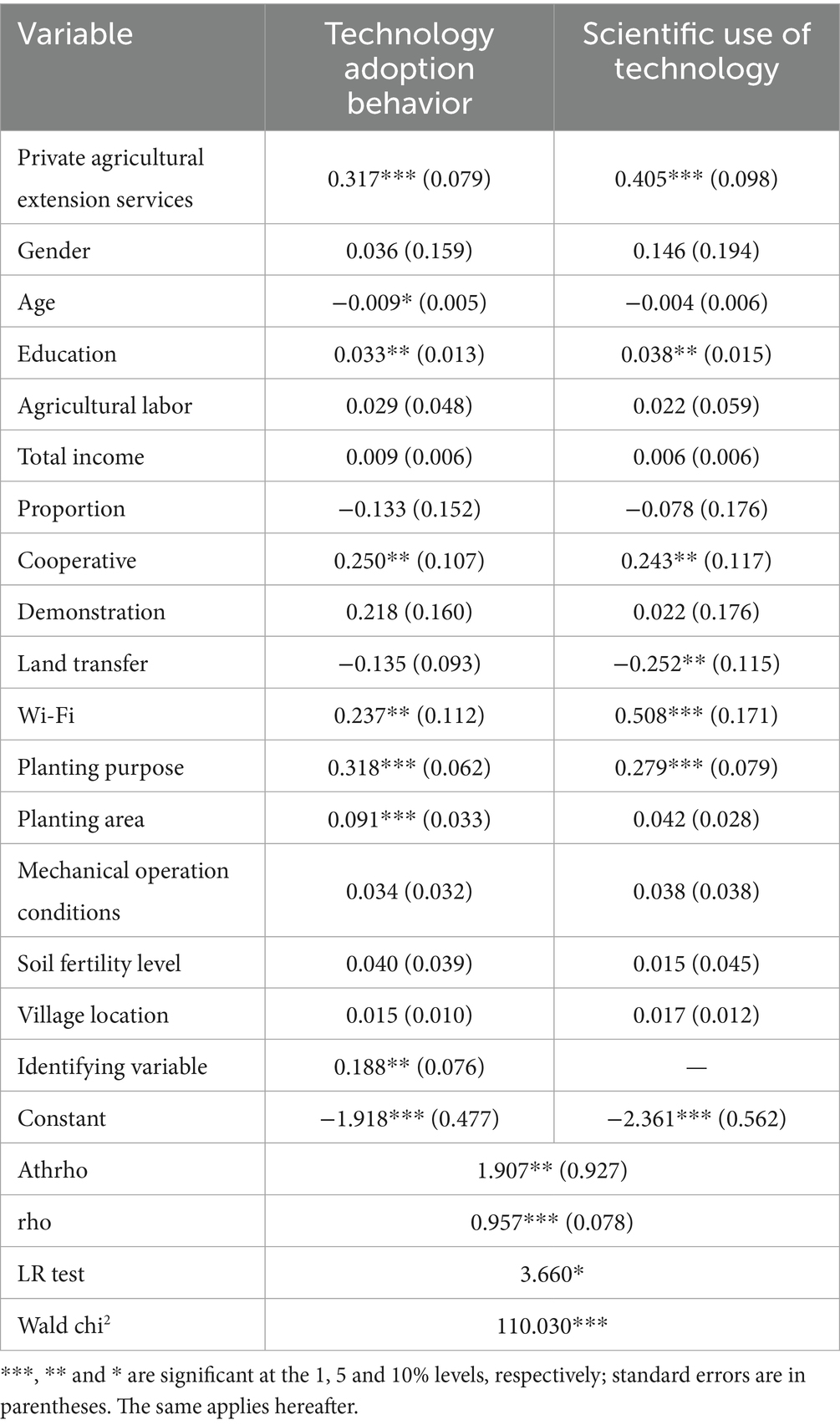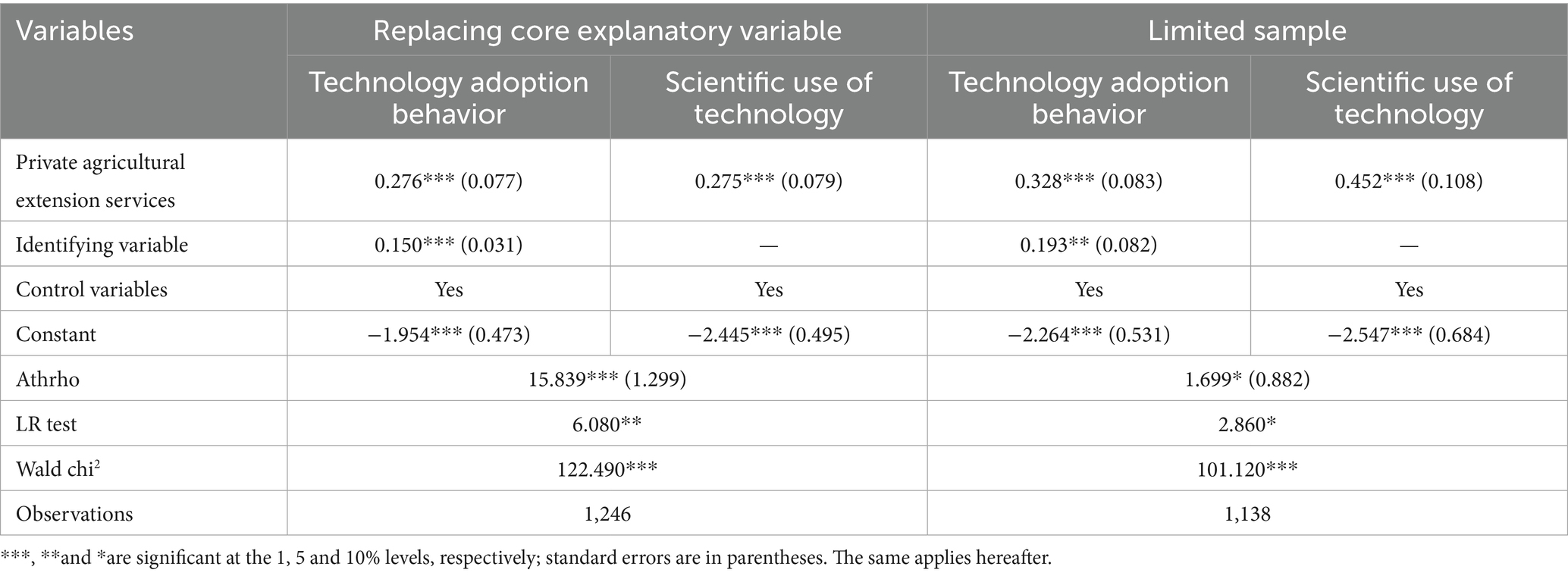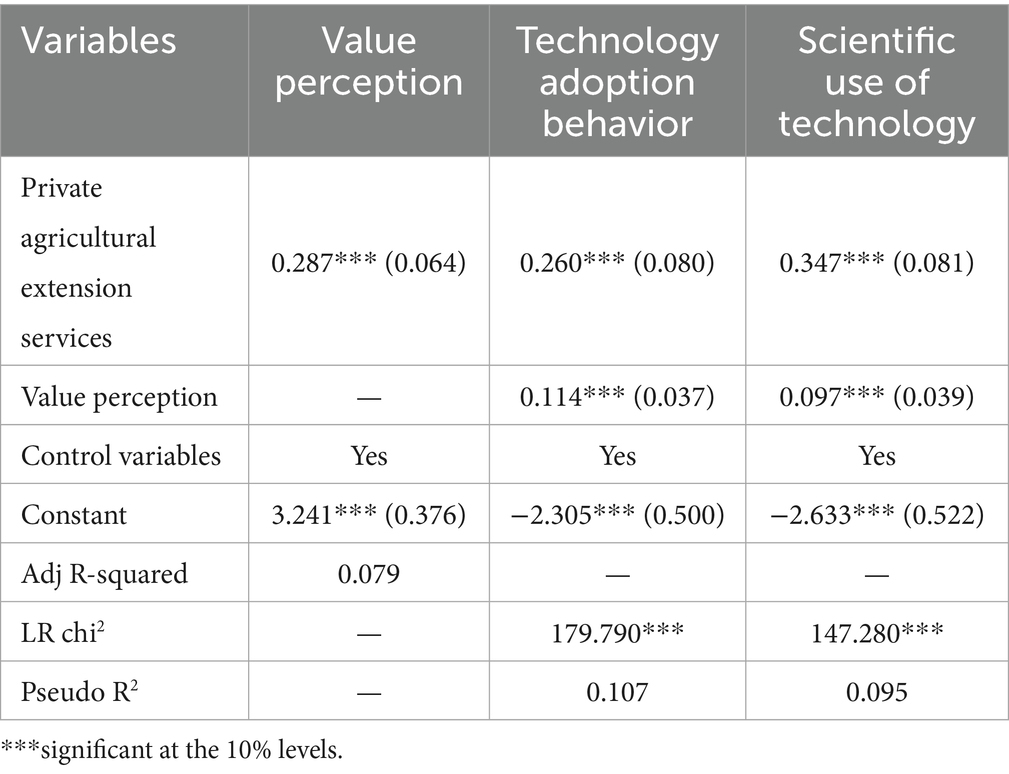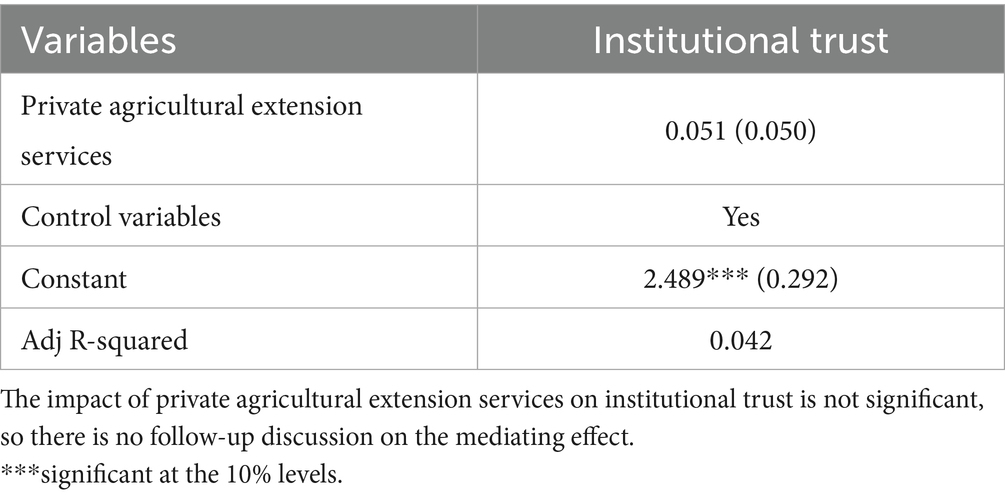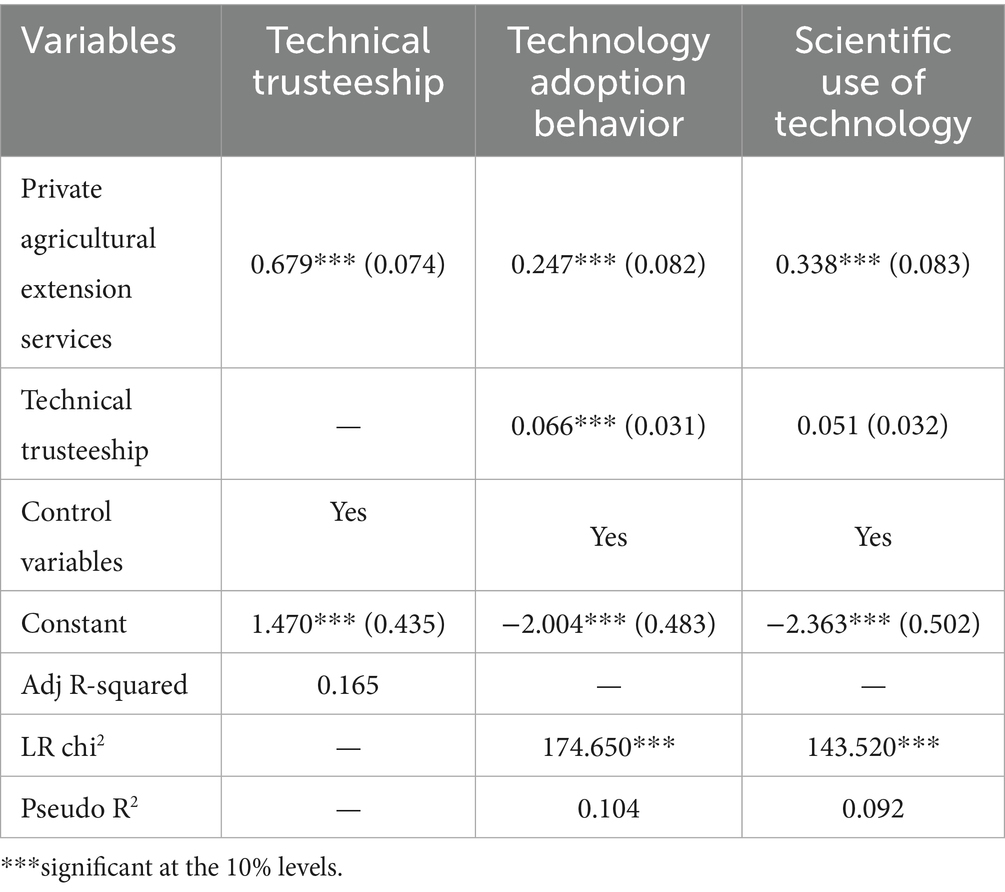- 1Institute of Finance and Economics, Wuhan City Polytechnic, Wuhan, China
- 2School Law and Business, Wuhan Institute of Technology, Wuhan, China
- 3College of Economics and Management, Huazhong Agricultural University, Wuhan, China
- 4School of Economics and Management, Hubei University of Education, Wuhan, China
Introduction: Private agricultural extension services play an increasingly vital role in agricultural technology dissemination.
Methods: Using multiple econometric models and survey data from 1,246 farmers in Hubei Province, this study examines the effects and underlying mechanisms of private agricultural extension services on farmers’ decisions to adopt scientific fertilization technologies.
Results: The findings reveal three key insights: First, these services positively influence farmers’ fertilization behavior, significantly increasing their adoption of scientific fertilization technologies and promoting their proper application. Second, Private agricultural extension services can promote farmers to adopt scientific fertilization technology through value perception and technology trusteeship. Third, heterogeneity analysis identifies technology-specific differences in the impact of private agricultural extension services on adoption decisions, showing stronger effects on the adoption of efficient fertilization techniques compared to novel fertilizer products.
Discussion: The research illuminates the micro-mechanisms through which private agricultural extension services operate and supports building a dual-driven “government-led, market-driven” agricultural technology diffusion system.
1 Introduction
In the context of ongoing agricultural transformation and upgrading, China’s agricultural production technologies are advancing steadily. Agricultural production and operations are gradually shifting from “traditional agriculture” to a “new agriculture” model characterized by a diversified structure, high productivity, and added value. However, due to the long-standing lag in the adoption of advanced production resources, many Chinese farmers still rely on increased input levels to maintain basic production efficiency (Yu et al., 2023). Although the fertilizer utilization rate for China’s three major grain crops has surpassed 40%, it remains considerably lower than the 50–60% efficiency levels seen in developed countries in Europe and the United States. This highlights that fertilizer utilization efficiency among Chinese farmers is still relatively low, and significant progress is needed to achieve reductions in fertilizer use while improving efficiency (Liao et al., 2025).
To address this challenge, China has developed and promoted a series of scientific fertilization technologies, including innovative fertilizer products such as private organic fertilizers and slow-release fertilizers, along with efficient fertilization techniques like soil testing and formulation techniques as well as side-deep fertilization (Wang P et al., 2024). However, traditional fertilization practices remain prevalent among farmers, with the adoption outcomes of scientific fertilization technologies falling significantly short of expectations (Ruzzante et al., 2021; Li and Ma, 2021). A key contributing factor is the insufficient supply of supporting technical extension services, which diminishes farmers’ motivation to adopt scientific fertilization technologies or increases implementation risks. Therefore, optimizing the current scientific fertilization technology extension system from a service supply perspective has become imperative. This optimization should address farmers’ needs for modifying existing production practices while providing daily technical guidance tailored to specific agricultural technologies (Sun, 2021).
From a practical standpoint, China has established a dual agricultural technology extension service system. This system includes a public welfare component, led by the government, agricultural departments such as agricultural stations, and research institutions like universities, as well as a market-driven component led by private organizations, including agriculture-related enterprises and agricultural stores, developed over the course of socialist construction (Hu et al., 2024). Currently, this system shows a trend toward “diversification.” Furthermore, as public welfare agricultural technology extension services gradually decline, market-oriented services are increasingly taking on a more prominent role (Hu et al., 2024). Scholars suggest that, as the service providers that engage most frequently with farmers, private agricultural extension services possess a more comprehensive understanding of farmers’ needs than other organizations (Mungai et al., 2024; Sahu et al., 2024). By offering products and technologies that directly address these needs, they are well-positioned to facilitate the rapid dissemination of agricultural scientific and technological advancements.
However, the primary motivation for private entities to participate in agricultural technology extension services often lies in the pursuit of maximizing their own profits. As a result, some of these entities may deceive farmers in market operations to secure higher returns, causing financial losses for the farmers. Due to these trust issues, farmers often approach the agricultural extension services provided by these private entities with caution (Willy and Edson, 2016), which significantly hinders the adoption of agricultural scientific and technological advancements. Despite these challenges, the current agricultural distribution system-dominated by agricultural stores and agribusinesses-reaches nearly every village in China (Sun, 2021), highlighting its critical role within the grassroots agricultural extension system. Therefore, understanding the relationship between private agricultural technology extension services and farmers’ technology adoption decisions is essential for building an effective grassroots agricultural technology extension service system and facilitating the widespread adoption of agricultural technologies.
Some scholars have highlighted the significant role of private agricultural technology extension services in influencing farmers’ adoption decisions regarding scientific fertilization technologies, though opinions on this issue remain divided. One group of researchers argues that private agricultural extension services not only sell agricultural products to farmers by leveraging strong interpersonal relationships (Seli et al., 2024), but also share valuable agricultural technology information through communication, thereby encouraging farmers to adopt scientific fertilization techniques (Wang P et al., 2024; Qiao et al., 2022; Li et al., 2022). This, in turn, supports the green transformation of agriculture. Conversely, other studies contend that business entities, such as agricultural stores and agribusinesses, often prioritize selling more fertilizers to maximize profits, which can lead to excessive and unscientific fertilizer use among farmers (Zhang and Fu, 2023; Popescu and Safta, 2022), hindering efforts toward sustainable agricultural practices.
It is evident that leveraging the incentive effect of private agricultural technology extension services on farmers’ decisions to adopt scientific fertilization technologies plays a crucial role in promoting the green transformation of agriculture. However, few studies have explored the impact of these services on farmers’ adoption of scientific fertilization methods. Currently, many farmers struggle to fully understand the value of scientific fertilization technology, often relying heavily on traditional production practices and experience. This tendency not only lowers the overall adoption rate of such technologies but also results in a disconnect, often referred to as the “two skins” phenomenon, between technology adoption and scientifically informed usage (Yu et al., 2023; Zhou et al., 2021). Unlike general agricultural green production technologies, scientific fertilization requires that farmers’ application behavior post-adoption reflects its technical standards. Therefore, when examining the impact of private agricultural extension services on farmers’ adoption of scientific fertilization technology, it is important to consider not only their adoption behavior but also their subsequent usage behavior.
Existing studies offer valuable insights for this paper; however, there is still scope for further development. First, previous literature presents inconsistent views on the relationship between private agricultural technology extension services and agricultural green transformation. Second, much of the current research focuses on farmers’ adoption of fertilization technologies, with insufficient analysis of how these services affect farmers’ behavior in using fertilizer application technologies. To address these gaps, this paper uses micro-level data from 1,246 farmers in rice-producing regions of Hubei Province, considering the context of agricultural green transformation and the ongoing promotion of scientific fertilization. This study aims to examine the effects and underlying mechanisms by which private agricultural extension services influence farmers’ adoption and application of scientific fertilization technologies. By doing so, this research seeks to offer practical insights for building a modern scientific fertilization extension service system and advancing the goal of green agricultural development.
2 Theoretical framework and research hypotheses
Effective fertilizer application requires farmers to both access and properly implement scientific fertilization techniques. However, the technical complexity of these methods presents cognitive and learning barriers that frequently prevent farmers from achieving the required proficiency level (Kitchen et al., 2002). Consequently, most farmers depend on external technical guidance and support systems. With the diversification of agricultural extension services, entities such as agricultural stores and agriculture-related enterprises have assumed a significant role in the agricultural extension service system (Yu et al., 2023; Wang P et al., 2023), becoming primary sources of information on scientific fertilization for farmers. The influence of private agricultural extension services on farmers’ adoption decisions regarding scientific fertilization can be summarized in three main pathways.
First, private agricultural extension services can convey product and technology information to farmers through extensive agricultural distribution networks, enhancing farmers’ perceived value of scientific fertilization technologies (Qiao et al., 2022). Second, private entities build trust-based relationships through long-term interactions with farmers, leveraging this familiarity to promote new technologies or products effectively (Morgan et al., 2020; Giulivi et al., 2022). Third, these services provide agricultural technology and technical support, such as technical guidance and hosting, which encourage farmers to adopt scientific fertilization techniques either actively or passively (Li et al., 2022; Liu et al., 2019). The detailed analysis is as follows.
2.1 Value transmission: enhancing farmers’ technological value perception
Farmers’ value perception captures their cognitive assessment of agricultural technologies and the trade-offs preceding adoption decisions (Rogers and Shoemaker, 1971; Huber et al., 2024). Technology adoption depends not only on dissemination methods but fundamentally on farmers’ perceived value of innovations. As rational economic actors, farmers exhibit inherent preference for technologies demonstrating clear utility (Gao et al., 2024). Information acquired through agricultural extension services undergoes cognitive processing and mental representation, ultimately crystallizing into value perceptions that guide decision-making (Qiao et al., 2022). Unlike traditional fertilization methods, scientific fertilization prioritizes ecological benefits and environmental protection values (Li and Ma, 2021).
2.2 Benefit generation through relational mediation: the private logic of acquaintance networks
Embeddedness theory asserts that individual economic actions are socio-structurally embedded within relational frameworks (Granovetter, 1973). This phenomenon manifests distinctively in China’s rural “acquaintance society,” where relational networks exert substantive influence on agricultural production decisions through multifunctional mechanisms (Gao et al., 2023). The comprehensive penetration of agricultural input distribution systems across Chinese villages has facilitated the emergence of trust-based symbiosis between farmers and private entities (e.g., agro-dealers, agribusinesses) (Manasa et al., 2024; Kumar et al., 2020; Li et al., 2019). Through longitudinal interactions, these market-oriented actors have developed “relational trust capital,” a localized social credibility that permeates their private territories. Such trust capital significantly lowers adoption barriers, enhancing farmers’ propensity to accept technologies promoted by private agricultural extension systems.
2.3 Service supply: from technology-material integration to technology trusteeship
Initially, agricultural technical services primarily served as auxiliary products for agricultural inputs, functioning as key tools for private agricultural extension organizations to boost sales (Sun, 2021). However, with the development of agricultural socialized services, market players like agricultural input stores and agribusinesses have transitioned from being “single-product vendors” to “comprehensive service providers.” The emergence of innovative models like technology trusteeship has further transformed how private agricultural extension organizations participate in farmers’ production decisions (Ma et al., 2021). Private agricultural extension organizations now influence scientific fertilization adoption through two main pathways: First, they provide agronomic guidance during fertilizer sales, conveying essential information about application ratios and nutrient balance, thereby promoting proper technology adoption through information dissemination (Giulivi et al., 2022). Second, through technology trusteeship arrangements, they enable passive adoption by offering technical equipment, products, and complete fertilization management, even when farmers lack independent implementation capacity (Ma et al., 2021). This study argues that private agricultural extension organizations can shape farmers’ scientific fertilization decisions through these service-oriented approaches, either by promoting specific technologies or directly providing technical services (Figure 1).
Based on the above analysis, this study proposes the following research hypotheses:
H1: Private agricultural extension services positively influence farmers’ scientific fertilization technology adoption decisions.
H2: Private agricultural extension services facilitate scientific fertilization adoption through value perception enhancement.
H3: Private agricultural extension services promote scientific fertilization adoption via institutional trust building through acquaintance networks.
H4: Private agricultural extension services support scientific fertilization adoption through technology trusteeship services.
3 Methodology
3.1 Data collection
The dataset employed in this research originates from field surveys administered to rice-growing households in Hubei Province by our research group between July and August 2022. Hubei Province was chosen as the research site based on two key considerations: First, rice stands as one of China’s three major grain crops. Hubei Province, among China’s 13 primary grain-producing regions, represents a key rice cultivation zone in the Yangtze River Basin, renowned as the ‘Jingchu Granary’. In 2021, rice cultivation in Hubei accounted for 7.60% of the nation’s total sown area and 8.85% of total production. Second, agricultural technology extension efforts in Hubei have yielded significant achievements. By 2022, the agricultural science and technology contribution rate in the province had surpassed 63%, marking an 8 percentage point increase over the previous decade. Consequently, using Hubei’s rice-growing regions as a case study holds substantial importance for elucidating the promotion mechanisms of scientific fertilization technologies and advancing the green transformation of the rice industry.
The study adopted a multi-stage random sampling method. Initially, six municipalities (Tianmen, Xiantao, Zhijiang, Yunmeng, Songzi, Zhongxiang) were selected as sampling areas based on research feasibility. Subsequently, 2–4 townships were randomly selected from each sampled county-level division. Then, 2–4 administrative villages were chosen from each selected township. Ultimately, 15–20 farming households were randomly selected as respondents in each sampled village. The survey encompassed five core modules: household demographics, agricultural operations, adoption of scientific fertilization techniques, agricultural extension services, and village characteristics. Given the predominance of middle-aged/elderly respondents with limited formal education among rice-growing households, face-to-face structured interviews were implemented. Trained postgraduate and undergraduate researchers recorded responses based on farmers’ explicit answers during field interviews. After removing questionnaires with excessive missing data or internal inconsistencies, 1,246 valid responses were retained for analysis.
3.2 Variables
3.2.1 Dependent variables
The dependent variable in this study is farmers’ adoption decision of scientific fertilization technologies, measured through two dimensions: “technology adoption behavior” and “scientific use of technology.” Technology adoption behavior refers to whether farmers adopt efficient fertilization techniques or new fertilizer products, while scientific use of technology indicates whether these technologies are applied according to technical specifications and product descriptions. Based on “China’s 2021 Scientific Fertilization Technology Training Initiative,” scientific fertilization technologies include efficient fertilization technologies (e.g., soil testing and formula fertilization, side-deep fertilization), novel fertilizer products (e.g., slow-release fertilizers, water-soluble fertilizers, commercial organic fertilizers), and organic fertilizer substitution techniques (e.g., manure returning, straw returning). According to the action plan and previous studies, efficient fertilization technologies selected in this paper include soil testing and formula fertilization and side-deep fertilization, while novel fertilizer products comprise water-soluble fertilizers, slow/controlled-release fertilizers and commercial organic fertilizers.
3.2.2 Independent variable
This study examines the role of private agricultural extension services in promoting scientific fertilization technology adoption decisions among farmers. Drawing on previous research (Wang P et al.,2024; Paschen et al., 2021), we measure this variable based on whether farmers have received scientific fertilization technology services from private-sector providers, including agricultural input retailers and agribusinesses.
3.2.3 Mechanism variables
This study employs three key proxy variables to examine different pathways. First, “value perception” represents the value transmission pathway, measured by farmers’ agreement with the statement that adopting scientific fertilization technologies protects ecological environment and arable land quality. Second, “institutional trust” captures symbiotic benefit pathways, assessed through farmers’ confidence in agro-dealers and agricultural enterprises as technical service providers. Third, “technical trusteeship” reflects service provision pathways, evaluated by farmers’ willingness to purchase managed fertilization services. All variables use five-point Likert scales for measurement.
3.2.4 Control variables
This research employs a comprehensive covariate adjustment framework encompassing four dimensions: individual characteristics, household characteristics, production-operation characteristics, and community-level characteristics. Individual characteristics include gender, age, and educational attainment of respondents. Household characteristics consist of number of agricultural laborers, total household income, agricultural income share, cooperative membership status, model household designation, land transfer-in status, and WiFi installation. Production-operation characteristics cover cultivation purpose, planted area, mechanization capacity, and soil fertility levels. Community-level controls include geospatial positioning relative to township government. Variable definitions and descriptive statistics are detailed in Table 1.
3.3 Empirical model
Farmers’ decision-making on adopting scientific fertilization technology is not a single decision but a typical stepwise adoption process. Specifically, farmers first decide whether to adopt the technology, then adopters must further decide whether to use it according to technical specifications. Therefore, conventional binary choice models cannot meet the research requirements. Accordingly, this study employs the Heck-Probit model for estimation, with the model specified as follows:
Equations 1 and 2 represent the outcome equation and selection equation, respectively. can only be observed when . Here, and are the dependent variables, and represent latent variables in two groups, and denote vectors of explanatory variables, and are corresponding coefficients to be estimated, and are residual terms, with i indicating the observation sequence. Based on the sample selection mechanism, the unconditional probability model is constructed as:
In the above equations, denotes the correlation coefficient, . Based on Equations 3–5, the log-likelihood function is constructed as follows:
In Equation 6, represents the sample size when ; denotes the sample size when ; is the sample size when ; stands for the log-likelihood value; and correspond to the cumulative standard normal distribution function and the cumulative bivariate normal distribution function, respectively.
4 Empirical results and analysis
4.1 Baseline regression results
This study employs the Heck-Probit model to examine the impact of private agricultural extension services on farmers’ adoption decisions regarding scientific fertilization technologies. Following Chen et al. (2020), we utilize “whether acquaintances adopt the technology” as the identification variable. This is because farmers’ adoption of green production technologies typically exhibits “herd behavior” characteristics. When more neighboring farmers adopt the technology, imitative behavior emerges, leading to adoption decisions. Numerous studies confirm the positive role of “neighborhood effects” in promoting technology adoption (Niu et al., 2022; Manda et al., 2024). However, farmers’ scientific application behaviors rely more on self-discipline than mandatory constraints. Therefore, technical training activities cannot directly influence whether farmers use technologies scientifically. The paper also constructed two simple models and found that the coefficient of influence of the identifying variables on the adoption behavior of scientific fertilizer technology by farmers was significant (p = 0.007) and the coefficient of influence on the scientific use of technology by farmers was not significant (p = 0.178). This verifies the direct impact on adoption but not implementation, justifying the identification variable selection. Table 2 reports the model estimation results.
Table 2 indicates that the Athrho value and LR test passed significance tests at 5 and 10% levels respectively, confirming sample selection bias and justifying the use of the Heck-Probit model. The Wald chi2 statistic is significant at the 1% level, indicating strong model fit. Empirical results show that private agricultural extension services significantly positively influence farmers’ adoption and proper implementation of scientific fertilization techniques at the 1% level, validating Hypothesis 1. This suggests that market entities like agro-input suppliers effectively promote farmers’ adoption decisions through technical services. Therefore, policymakers should incentivize market actors to participate in fertilization initiatives and develop diversified extension systems.
Age exhibits a significant negative impact on farmers’ adoption of scientific fertilization technologies, indicating older farmers are less likely to adopt these practices. This aligns with findings that younger farmers show greater receptiveness to technological innovations and information acquisition (Wang X et al., 2023). Conversely, education level demonstrates a strong positive correlation with both adoption and proper implementation of fertilization technologies. Higher education enables farmers to better understand sustainable agricultural benefits and improves their technical literacy regarding fertilization schedules and dosage precision, leading to more scientifically sound application of adopted technologies (Wang P et al., 2024; Wang J et al., 2024).
Participation in cooperatives shows a significant positive correlation with both the adoption and scientific use of fertilization technologies within household characteristics, suggesting that cooperative involvement enhances farmers’ technical compliance. Cooperatives exert regulatory influence through unified field management and production stewardship, aligning member farmers’ practices with technical specifications to optimize adoption and application efficiency (Wang P et al., 2024). Land transfer demonstrates a significant negative impact on the scientific use of fertilization technologies. Short-term informal land leases create tenure instability, prompting farmers to prioritize low-risk conventional methods rather than fully adhering to technical protocols (Mao et al., 2021). Households with Wi-Fi connectivity demonstrate a more scientific adoption of technology. This is likely because enhanced digital access enriches farmers’ private knowledge and diminishes uncertainties in implementation.
Planting purpose shows a significant positive correlation with both adoption and scientific use of fertilization technologies. Farmers engaged in both subsistence and private production demonstrate stronger adoption and more scientific implementation, as they balance food safety concerns with profit motives while seeking to meet quality standards. The planting area has a significantly positive impact on farmers’ adoption behavior of scientific fertilization technology. Larger farm operations show greater adoption rates due to scale effects that reduce per-unit technology conversion costs and lower adoption thresholds.
4.2 Robustness test
This study conducted robustness tests through core explanatory variable substitution and sample restriction methods, with verification results presented in Table 3. Initially, “whether agricultural input stores or agribusinesses serve as your primary channel for obtaining technical information” was selected as the proxy variable for private agricultural extension services, coded as 0 or 1. Results demonstrate that post-substitution regression outcomes remained consistent with baseline estimations, confirming the robustness of original findings. Subsequently, subsamples with “household consumption” planting purposes were excluded for revalidation, given their documented lower demand for green technologies (Wang P et al., 2024). The obtained results aligned with baseline regression outcomes, further substantiating their robustness.
In addition, this paper also uses the endogenous switching Probit model and uses the counterfactual analysis method to estimate the average treatment effect (ATT) of farmers’ acceptance of different agricultural technology extension service organizations on farmers ‘scientific fertilization technology adoption decisions. The estimated results are shown in Table 4. The results indicate that there is a significant positive treatment effect of private agricultural extension services on both scientific fertilizer technology adoption behavior and scientific use of technology by farmers. The robustness of the benchmark regression results was further verified.
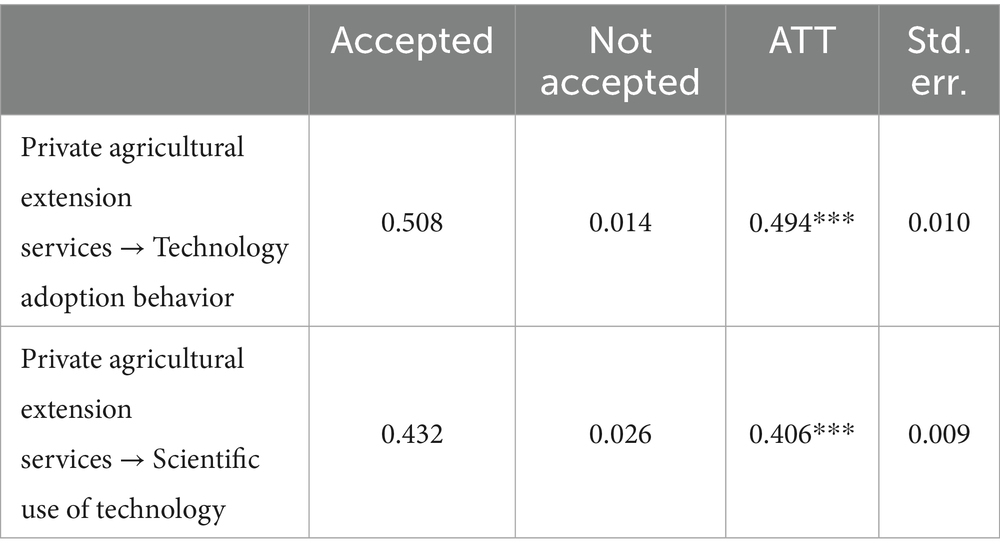
Table 4. The average treatment effect of private agricultural extension services on farmers’ adoption decision of scientific fertilization technology.
4.3 Mechanism test
The regression results confirm that private agricultural extension services significantly enhance farmers’ scientific fertilization technology adoption decisions. To examine the underlying mechanisms, this study investigates three pathways: (1) value perception transmission, (2) symbiotic benefit generation through institutional trust, and (3) technology trusteeship provision. Following the methodological approach of Wen and Ye (2014), we analyze the impact of private agricultural extension services on farmers’ adoption decision-making for these technologies. The empirical findings are presented in Tables 5–7.
The results of Table 5 show that value perception has a significant mediating effect in the path of private agricultural technology extension services on farmers ‘scientific fertilization technology adoption behavior and technology science use behavior. This is because the private agricultural technology promotion service can transmit the information of scientific fertilization technology to farmers through technical training, thus improving the farmers ‘cognition level of the value of scientific fertilization technology, thus promoting the scientific fertilization of farmers.
Table 6 indicates that private agricultural extension services have a positive yet statistically non-significant impact on institutional trust. This suggests that while such services may enhance farmers’ trust in operating entities, the effect remains limited. A plausible explanation is that establishing farmers’ trust in business entities requires long-term communication. Higher contact frequency typically correlates with stronger trust; however, this study employs binary variables to measure private agricultural extension services, which may inadequately capture the true impact of these services on trust levels.
The results of Table 7 show that technical trusteeship has a significant mediating effect on the adoption behavior of farmers’ scientific fertilization technology by private agricultural technology extension services, and the mediating effect is not significant in the path of private agricultural technology extension services to farmers’ scientific use of technology. This may be because technical trusteeship, as a materialized service, acts more directly on the path of technology adoption behavior.
4.4 Heterogeneity analysis
4.4.1 Heterogeneity analysis based on technology type
The heterogeneous attributes of different scientific fertilization technologies may lead to differential impacts of private agricultural extension services on farmers’ adoption behaviors across technology types. Accordingly, this study categorizes scientific fertilization technologies into efficient application techniques and novel fertilizer products. Recognizing potential concurrent adoption of both technology types in practice, the analysis employs a Bivariate Probit model accommodating correlated disturbance terms. Model estimates (Table 8) reveal statistically significant Athrho and LR test values, confirming residual correlation between adoption decisions and validating the Bivariate Probit specification. The statistically significant Wald chi2 statistic indicates satisfactory model fit.
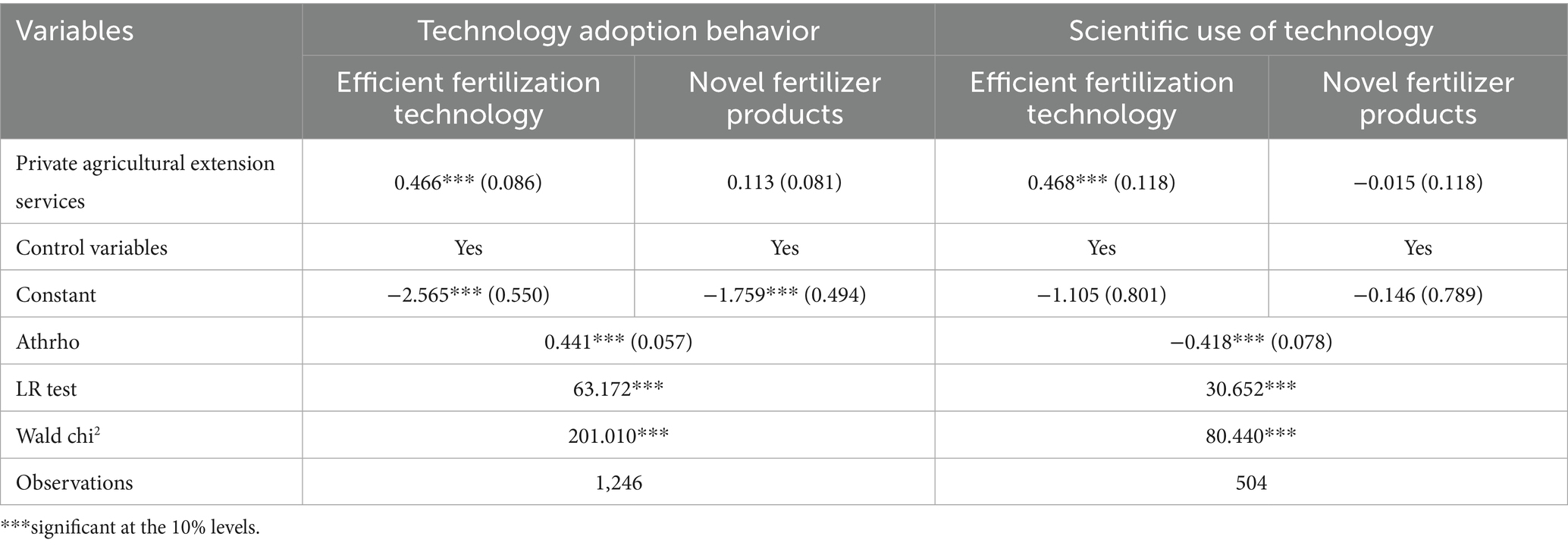
Table 8. Estimation results of the impact of private agricultural extension services on farmers’ adoption decisions of different types of scientific fertilization technology.
Analysis of farmers’ technology adoption behaviors reveals that private agricultural extension services exert a significant positive impact on efficient fertilization technology adoption, while showing no significant effect on novel fertilizer product adoption. Regarding technology implementation behaviors, private services significantly improve scientific application of efficient fertilization techniques, but fail to meaningfully affect proper utilization of novel fertilizer products. This differential impact highlights the stronger effectiveness of private extension services in driving efficient fertilization technology adoption decisions. The observed divergence in conclusions may arise because compared to user-friendly novel fertilizer products, farmers face greater technical complexity in adopting high-efficiency fertilization techniques, thus necessitating greater reliance on private extension services for technical guidance.
4.4.2 Heterogeneity analysis based on planting scale
Empirical evidence confirms planting scale serves as both a critical factor influencing farmers’ production decisions and a determinant affecting their access to technological extension services. Research reveals private agricultural extension services increasingly prioritize large-scale producers, leaving smallholders technologically marginalized (Sun, 2021). This reality necessitates rigorous examination of whether scale-biased extension strategies align with agricultural quality development goals. Accordingly, we investigate how private extension services affect fertilization technology adoption across farm scales. We stratify farmers into smallholders (<2 ha) and large-scale operators (≥2 ha) based on rice cultivation area. Table 9 demonstrates that private agricultural extension services significantly enhance both technology adoption behavior and scientific use of technology among all farmers, regardless of farm size. These services effectively promote scientific fertilization decisions among both smallholders and large-scale producers, confirming their universal applicability in facilitating proper fertilization practices.

Table 9. Estimation results of private agricultural extension services on scientific fertilization technology adoption decisions by planting scale.
5 Conclusion, policy implications and limitations
Under the dual context of agricultural production transformation and grassroots extension system reforms, private agricultural extension services have become a key channel for farmers to access production technologies. Using survey data from 1,246 rice farmers in China’s major rice growing areas, this study empirically examines how private agricultural extension services influence scientific fertilization adoption decisions and their mechanisms.
Our study showed that: First, private agricultural extension services significantly promote farmers’ adoption behavior and scientific use of fertilization technologies, and this conclusion remains valid after robustness tests. Second, private agricultural extension services can drive farmers’ adoption decisions of scientific fertilization technologies by enhancing their value perception of the technologies and willingness to adopt technical trusteeship during fertilization. Third, heterogeneity analysis reveals that private agricultural extension services have a significantly positive impact on farmers’ adoption decisions regarding efficient fertilization technologies but no significant effect on novel fertilizer product adoption. Additionally, these services exhibit significantly positive impacts on scientific fertilization technology adoption decisions across different farm scales.
Our results provide valuable insights for agricultural advancement in China and other developing nations. First, emphasize the critical role of private agricultural extension services in promoting scientific fertilization among farmers, encourage various market entities to participate in agricultural technology extension services, and actively explore diversified forms of extension services. Second, enhance farmers’ awareness of the value of scientific fertilization technologies. During the extension process, emphasize the economic and ecological benefits of scientific fertilization to help farmers develop a scientific fertilization mindset, thereby increasing their initiative and enthusiasm for adopting these practices.
Third, increase the emphasis on agricultural production trusteeship services, enrich the service offerings of market entities, and establish an endogenous long-term mechanism to transform farmers’ production behaviors through technical trusteeship services. Fourth, develop differentiated promotion strategies for different types of scientific fertilization technologies, providing tailored extension services to farmers with varying technical preferences. Fifth, balance the focus of agricultural extension services, address the service needs of smallholders, and establish a technology extension system that meets the demands of smallholders through effective integration of government and market efforts, thereby achieving effective integration of farmer groups with modern agricultural production technologies.
However, this study has several limitations. First, while Hubei Province is a major grain-producing region, farmers’ adoption decisions regarding fertilization technologies in different grain production zones may be influenced by localized policies and market environments. Second, the use of cross-sectional data prevents observation of lag effects and persistence in technology adoption. Third, the failure to differentiate the private pathways among diverse private entities may obscure critical mechanisms. Fourth, the measurement of value perception ignores the measurement of farmers ‘economic value of scientific fertilization technology. Future research should expand to other major grain-producing regions in China, and the sample size can be expanded to construct panel data to capture dynamic effects. Additionally, in-depth mechanism studies focusing on different types of private agricultural technology extension service organizations would be valuable. Farmers’ perceptions of the economic value of scientific fertilization technologies should also be examined.
Data availability statement
The datasets presented in this article are not readily available because the data that are presented in this study are available from the corresponding author upon request. The data are not publicly available due to privacy restrictions. Requests to access the datasets should be directed to cGFud2FuZ0B3aGNwLmVkdS5jbg==.
Author contributions
PW: Methodology, Data curation, Investigatin, Writing – original draft, Writing – review & editing. HL: Conceptualization, Writing – original draft. YH: Conceptualization, Funding acquisition, Writing – review & editing. QZ: Data curation, Writing – original draft. DL: Supervision, Writing – review & editing.
Funding
The author(s) declare that financial support was received for the research and/or publication of this article. This work was supported by the National Natural Science Foundation of China (grant number 72203163); Hubei Provincial Department of Education Science and Technology Research Project (grant number Q20221503); Special Doctoral Project at the School Level of Wuhan City Polytechnic (grant number 2024WHCPRB07).
Conflict of interest
The authors declare that the research was conducted in the absence of any commercial or financial relationships that could be construed as a potential conflict of interest.
Generative AI statement
The author(s) declare that no Gen AI was used in the creation of this manuscript.
Publisher’s note
All claims expressed in this article are solely those of the authors and do not necessarily represent those of their affiliated organizations, or those of the publisher, the editors and the reviewers. Any product that may be evaluated in this article, or claim that may be made by its manufacturer, is not guaranteed or endorsed by the publisher.
References
Chen, X. T., Huang, W. H., Qi, Z. H., and Feng, Z. C. (2020). Farmers’ cognition, adoption intensity and income effect of ecological breeding mode: a case study of rice-shrimp co-cultivation mode in the middle and lower reaches of Yangtze River. Chin. Rural Econ. 10, 71–90. Available at: https://kns.cnki.net/kcms2/article/abstract?v=R2bxtEM5djDFcrSaRB9t3jeTQ0azBx-3R-0xrP0-PHDnKqwY8f8SNx_ei5QGxJrA_kEXErhVZ8STeUL1rEbK4hm7bKzaK5OGvoEltemlhsffXhdptHQLshT8SzHMUnb9yyPW9_BaVqMPftIDieyQ_JvXzpvsJOyuud7UCvO-uS-bxyJ3vP1K6Q==&uniplatform=NZKPT&language=CHS
Gao, C., Li, G., Du, Y., and Wanyan, Y. (2023). Face or relational benefits? Research on the influencing mechanism on repurchase intention for agricultural inputs. Sustain. For. 15:15137. doi: 10.3390/su152015137
Gao, T., Lu, Q., Zhang, Y., and Feng, H. (2024). Does farmers’ cognition enhance their enthusiasm for adopting sustainable digital agricultural extension services? Evidence from rural China. Sustain. For. 16:3972. doi: 10.3390/su16103972
Giulivi, N., Harou, A. P., Gautam, S., and Guereña, D. (2022). Getting the message out: information and communication technologies and agricultural extension. Am. J. Agric. Econ. 105, 1011–1045. doi: 10.1111/ajae.12348
Granovetter, M. S. (1973). The strength of weak ties. Am. J. Sociol. 78, 1360–1380. doi: 10.1086/225469
Hu, X., Xiao, B., and Tong, Z. (2024). Technological integration and obstacles in China’s agricultural extension systems: a study on disembeddedness and adaptation. Sustain. For. 16:859. doi: 10.3390/su16020859
Huber, R., Kreft, C., Späti, K., and Finger, R. (2024). Quantifying the importance of farmers’ behavioral factors in ex-ante assessments of policies supporting sustainable farming practices. Ecol. Econ. 224:108303. doi: 10.1016/j.ecolecon.2024.108303
Kitchen, N. R., Snyder, C. J., Franzen, D. W., and Wiebold, W. J. (2022). Educational needs of precision agriculture. Precis. Agric. 3, 341–351. doi: 10.1023/A:1021588721188
Kumar, S., Roy, S., Atal, R., Panda, C. K., and Sohane, R. K. (2020). Knowledge gap of Agri-input dealers in farm production. CJAST 92-101, 92–101. doi: 10.9734/cjast/2020/v39i430535
Li, L., Li, G., Feng, X., Liu, Z., and Tsai, F. S. (2019). Moderating effect of dynamic environment in the relationship between guanxi, trust, and repurchase intention of agricultural materials. IJERPH 16:3773. doi: 10.3390/ijerph16193773
Li, Y. J., and Ma, J. (2021). Analysis of income effect differences of scientific fertilization technology — an empirical estimation based on farmers’ initial endowment. Aust. J. Agric. Econ. 7, 18–32. doi: 10.13246/j.cnki.jae.2021.07.002
Li, B., Zhuo, N., Ji, C., and Zhu, Q. (2022). Influence of smartphone-based digital extension service on farmers’ sustainable agricultural technology adoption in China. IJERPH 19:9639. doi: 10.3390/ijerph19159639
Liao, F., Zheng, Y., and Wang, X. (2025). Promoting the replacement of chemical fertilizer with organic fertilizer: the role of policy incentives and digital technology. Front. Sustain. Food Syst. 9:1527913. doi: 10.3389/fsufs.2025.1527913
Liu, Y., Ruiz-Menjivar, J., Zhang, L., Zhang, J., and Swisher, M. E. (2019). Technical training and rice farmers’ adoption of low-carbon management practices: the case of soil testing and formulated fertilization technologies in Hubei, China. J. Clean. Prod. 226, 454–462. doi: 10.1016/j.jclepro.2019.04.026
Ma, L., Wang, Y., and Teng, Y. (2021). Evolutionary game analysis of stakeholders under the whole process trusteeship mode of agricultural production. Kybernetes 51, 2877–2901. doi: 10.1108/k-01-2021-0068
Manasa, K., Jirli, B., Srishailam, B., and Saifuddin, M. D. (2024). Centrality of information sources in agricultural input networks: insights from social network analysis. Arch. Curr. Res. Int. 24, 75–81. doi: 10.9734/acri/2024/v24i8850
Manda, J., Feleke, S., Mutungi, C., Tufa, A. H., Mateete, B., Abdoulaye, T., et al. (2024). Assessing the speed of improved postharvest technology adoption in Tanzania: the role of social learning and agricultural extension services. Technol. Forecast. Soc. Change 202:123306. doi: 10.1016/j.techfore.2024.123306
Mao, H., Chai, Y., and Chen, S. (2021). Land tenure and green production behavior: empirical analysis based on fertilizer use by cotton farmers in China. IJERPH 18:4677. doi: 10.3390/ijerph18094677
Morgan, S. N., Mason, N. M., and Maredia, M. K. (2020). Lead-farmer extension and smallholder valuation of new agricultural technologies in Tanzania. Food Policy 97:101955. doi: 10.1016/j.foodpol.2020.101955
Mungai, L. M., Messina, J. P., Zulu, L. C., Chikowo, R., and Snapp, S. S. (2024). The role of agricultural extension services in promoting agricultural sustainability: a Central Malawi case study. Cogent Food Agric. 10:2423249. doi: 10.1080/23311932.2024.2423249
Niu, Z., Chen, C., Gao, Y., Wang, Y., Chen, Y., and Zhao, K. (2022). Peer effects, attention allocation and farmers’ adoption of cleaner production technology: taking green control techniques as an example. J. Clean. Prod. 339:130700. doi: 10.1016/j.jclepro.2022.130700
Paschen, J. A., Ayre, M., King, B., Reichelt, N., and Nettle, R. (2021). Shaking it up: the realities of “doing” co-innovation in a privatised agricultural advisory and extension system. J. Rural. Stud. 87, 338–351. doi: 10.1016/j.jrurstud.2021.09.003
Popescu, L., and Safta, A. S. (2022). Anti-competition agreements on agricultural fertilizers between cause and effect. ASRJ. 6, 9–22. doi: 10.9734/asrj/2022/v6i230126
Qiao, D., Li, N., Cao, L., Zhang, D., Zheng, Y., and Xu, T. (2022). How agricultural extension services improve farmers’ organic fertilizer use in China? The perspective of neighborhood effect and ecological cognition. Sustain. For. 14:7166. doi: 10.3390/su14127166
Rogers, E. M., and Shoemaker, F. F. (1971). Communication of innovations: A cross-cultural approach. 2nd Edn. New York: Free Press.
Ruzzante, S., Labarta, R., and Bilton, A. (2021). Adoption of agricultural technology in the developing world: a meta-analysis of the empirical literature. World Dev. 146:105599. doi: 10.1016/j.worlddev.2021.105599
Sahu, S., Bishnoi, S., Sharma, P. R., Satyapriya, Mahra, G. S., Burman, R. R., Barua, S., et al. (2024). Exploring popular information sources and determinants of farmers’ access to agricultural extension services in the indo-Gangetic Plains. Front. Sustain. Food Syst. 8:1339243. doi: 10.3389/fsufs.2024.1339243
Seli, L., Akbar, M., and Arianto, A. (2024). Supporting and inhibiting factors of agricultural extension interpersonal communication competence in Enrekang regency. KEG 6, 586–595. doi: 10.18502/keg.v6i1.15440
Sun, M. Y. (2021). Changes in the supply mode of basic agricultural technology services and the dilemma of farmers’ technology acquisition. Issues Agric. Econ. 42, 40–52. doi: 10.13246/j.cnki.iae.2021.03.004
Wang, X., Drabik, D., and Zhang, J. (2023). How channels of knowledge acquisition affect farmers’ adoption of green agricultural technologies: evidence from Hubei Province, China. Int. J. Agric. Sustain. 21:2270254. doi: 10.1080/14735903.2023.2270254
Wang, P., Li, G. C., and Liu, D. (2023). Impact of informatization of agricultural extension services on farmers’ scientific fertilization technology adoption decisions. Chin. J. Eco-Agric. 31, 2033–2043. doi: 10.12357/cjea.20230301
Wang, P., Liu, D., and Huang, Y. (2024). From technology adoption to scientific application: can agricultural extension services effectively promote farmers’ scientific fertilization? Pol. J. Environ. Stud. 33, 4747–4758. doi: 10.15244/pjoes/178009
Wang, J., Liu, R., Tian, M., Liang, F., Ren, W., and Ma, H. (2024). Environmental values, social networks, and farmers’ soil testing and formulated fertilization technology adoption: evidence from China. Environ. Dev. Sustain. 1-42. doi: 10.1007/s10668-024-05620-3
Wen, Z., and Ye, B. (2014). Analyses of mediating effects: the development of methods and models. Adv. Psychol. Sci. 22, 731–745. doi: 10.3724/SP.J.1042.2014.00731
Willy, T., and Edson, K. (2016). Trust, perception and effectiveness of extension services in Uganda: a case of National Agricultural Advisory Services (NAADS). J. Agric. Ext. Rural Dev. 8, 224–231. doi: 10.5897/JAERD2016.0806
Yu, X., Schweikert, K., Li, Y., Ma, J., and Doluschitz, R. (2023). Farm size, farmers’ perceptions and chemical fertilizer overuse in grain production: evidence from maize farmers in northern China. J. Environ. Manag. 325:116347. doi: 10.1016/j.jenvman.2022.116347
Zhang, B., and Fu, S. (2023). Do market pressure and social network affect farmers’ adoption of low-carbon fertilization practices? Evidence from China. Environ. Sci. Pollut. Res. 30, 51804–51815. doi: 10.1007/s11356-023-25664-8
Keywords: private agricultural extension services, scientific fertilization technology adoption decisions, value perception, institutional trust, technology trusteeship
Citation: Wang P, Li H, Huang Y, Qu Z and Liu D (2025) From technology adoption to scientific application: impact mechanism analysis of private agricultural extension services promoting scientific fertilization of farmers. Front. Sustain. Food Syst. 9:1628258. doi: 10.3389/fsufs.2025.1628258
Edited by:
Shizheng Tan, Taiyuan University of Technology, ChinaCopyright © 2025 Wang, Li, Huang, Qu and Liu. This is an open-access article distributed under the terms of the Creative Commons Attribution License (CC BY). The use, distribution or reproduction in other forums is permitted, provided the original author(s) and the copyright owner(s) are credited and that the original publication in this journal is cited, in accordance with accepted academic practice. No use, distribution or reproduction is permitted which does not comply with these terms.
*Correspondence: Di Liu, bGl1ZGlAaHVlLmVkdS5jbg==
 Pan Wang
Pan Wang Hui Li1
Hui Li1 Di Liu
Di Liu
